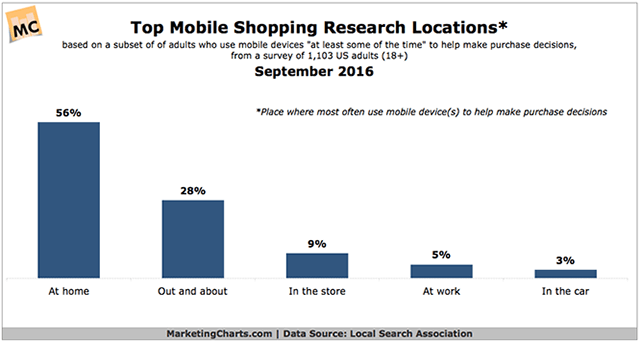
Are smartphones changing how Americans shop from home?
While much has been made about smartphone users’ ability to shop on the go, most mobile shopping research is being done at home, according to a study from the Local Search Association (LSA).
The survey of just over 1,100 U.S. adults found that of those saying that they used mobile devices “at least some of the time” to help make purchase decisions, 56 percent were conducting that research mostly at home. That was followed by “out and about,” 28 percent; “in the store,” nine percent; “at work,” five percent; and “in the car,” three percent.
These findings around home shopping use indicate that smartphones are either replacing or supplementing home use of tablets and PCs for shopping. The LSA survey found the at-home shopping behavior was more prevalent among 18-24-year-olds and those aged 65 and older.
A Nielsen survey of more than 3,700 mobile device owners taken in the fourth quarter found the most common shopping activity undertaken by both smartphone and tablet shoppers is researching an item before purchasing it (72 percent and 66 percent having done so in the prior 30 days, respectively). The second-most common action, checking the price of an item, was shared by both smartphone and tablet shoppers (70 percent and 57 percent, respectively).

Given their mobile nature, smartphone shoppers were much more likely to use a store locator, mobile coupon or lists while shopping. Smartphones were only slightly more likely to be used to read a review of an item (53 percent and 51 percent); and purchase an item (40 percent to 37 percent.)
A Pew Research Center survey from last fall found 68 percent of U.S. adults owned a smartphone while 45 percent had a tablet. Smartphone ownership is nearing the saturation point with some groups: 86 percent of those ages 18-29 have a smartphone, as do 83 percent of those ages 30-49 and 87 percent of those living in households earning $75,000 and up annually.
- Study: 56 percent of Mobile Shopping Research Happening at Home – Local Search Association
- Mobile Shopping Research Most Often Takes Place At Home – MarketingCharts
- What Are The Most Important Factors For Mobile Shoppers? – MarketingCharts
- Shop ‘Til They Drop… Or At Least Until Their Thumbs Hurt: Getting To Know The Mobile Shopper – Nielsen
- Technology Device Ownership: 2015 – Pew Research Center
Discussion Questions
DISCUSSION QUESTIONS: Do you see smartphones transforming the at-home online shopping experience? Are smartphones replacing or supplementing tablets and PCs as a purchasing tool in residences?


The smartphones are another element of the mobile channel. They seem — in my family — to be more of a research tool. For more information and research, people I know go to the iPad or PC. For smaller purchases they are fine — but for a major purchase the phone is not the place, at least for non-Generation Z humans.
As the introduction points out, the answer to this question is generational. I use my smartphone at home to call in my takeout pizza order and to make some restaurant reservations. Period. Why? Because I actually need to call one or both of these and so, I use the smartphone. I don’t see why I (anyone) would use the smaller-screen device to shop when one can use the easier-to-read iPad or desktop PC. But then, my parents couldn’t understand why I liked Led Zeppelin, either.
“Transform” is a BIG word. It is hard to imagine the trajectory of online shopping being transformed further. The smartphone is just another tool in the customer’s hands to access fast and convenient shopping.
Smartphones are so integrated into our lives we don’t even know how we use them … it just happens. I conducted research on behalf of AOL a few years ago that showed that nearly 70 percent of smartphone usage is at home but advertising was geared to SoLoMo. That was a big disconnect. Smartphones are just part of our sense-o-round life and so if it affects all elements of our life, that must include how we shop!
It’s not transforming — it’s just another device. But this does point out the need (which some people STILL don’t get) for your online presence to look good across all devices.
The screens on smartphones are too small for anyone other than Millennials to use them to transact a sale. Plus, too many retail websites are not mobile-friendly. Smartphones are great for finding retail locations and doing quick research on the go. They supplement tablets and PCs as purchasing tools. I expect their usage and influence to continue to grow.
I think the transformation has already happened based upon the most recent studies. Will mobile at-home shopping adoption continue to increase? Yes. In both developed and under-developed regions of the world, shoppers are going mobile-only very rapidly. In under-developed regions, shoppers have virtually skipped the PC stage. Tablets have not penetrated shopping to the degree mobile has.
Based on my research, for the Millennials the smartphone has changed the shopping experience at home as well as in stores. This generation appears to prefer the convenience of smartphones over the presentation benefits provided by the larger screens of tablets and PCs.
In addition, according to Deloitte, “Mobile-influenced sales are twice the value of e-commerce sales.” Also, mobile recently passed desktop/laptops in Internet usage. Smaller appears to be better!
Good point. Form factor matters. We do want display that makes it easy to ingest information and images, and we are so far willing to use a tablet, laptop or desktop to get it. I believe that one of the worthy offshoots of AR/VR will be the advancement of the form factor and interface for heads-up display. Add a gestural keyboard and that small device in our pocket becomes an even more useful personal assistant.
The smartphone is the key and portal to information. The device and its access to that information is immediately available because we carry it with us everywhere. We don’t determine to use a particular device as defined by our location. We use the most convenient and readily available device — period. I tend to make my online purchases from my laptop because of the keyboard while my children have no problem purchasing from their smartphones.
The smartphone is our third arm to reach for information or to fill our wants. As mobile browsing, app integration, mobile payments, voice interfaces and security improve, mobile commerce will increase. Folding displays that increase the surface area of high resolution images on a mobile device (OLED displays) are being engineered now, so the behaviors of today will be accelerated in the future. Yes, the form factor and portability of the smartphone’s personal information platform will become more important as a tool for commerce.
Why do they call them smartphones? The phone is usually the least used part of the mobile device. With that out of the way, this is just another channel — and a very popular channel. Customers use their mobile devices for research, finding store hours, ordering online, getting promotions and more. The best brands have figured out that mobile is a channel that is worth investing in. The goal is to create a consistent experience across all channels, which includes in-store. If you’re known for great service in-store, be known for an easy-to-use online (mobile) experience.
As they have become smarter and a little bigger, smartphones have become the device of choice for the technologically-unchallenged. Smartphones are replacing more than tablets and PCs. To name a few, they are replacing wrist watches, calculators, land-line phones, game consoles, TVs and social interaction. What we are seeing is close to addictive behavior. How can they not replace everything when they are habitually held in your face day and night? So, from a pragmatic view, anyone wanting to participate in digital commerce better look good and function correctly on smartphones.
I really can’t speak for everyone else however, for me, the smartphone has become an extension of me and goes everywhere I go. I don’t even watch TV without it on the chair arm so I can multi-task and look stuff up. So I am quite used to the size of the screen.
The more important thing here is that to use my PC means going to a specific place in my home — my home office — and after hours I really would prefer not to. My mindset changes in there. Perhaps if I carried my PC around the house, the story would be different.
Bottom line — we use what is most convenient and comfortable for our purpose.
And that’s my 2 cents.
It has happened and continues to happen more and more frequently. Using my house as an unofficial example: my wife has started to use her smartphone and iPad much more often, She, like others, said it speeds up her in-store process. She knows if what she wants is available and does not spend time looking. Of course this is not god for the retailers. They lose some of the impulse purchases.
Mobile is the broadest possible audience and it covers both users and non-users of traditional PCs. Retailers should be thinking mobile first and adapting the desktop version, not the other way around.
Smartphones are ubiquitous across all generations, save for the Silent Generation. However, I will tell you that my 90 year old mother is on her iPad throughout the day, and is even taking up texting on her phone.
Each month the Prosper Monthly Consumer Survey asks over 6,800 adults about their shopping methods over the past 30 days across 12 different merchandising categories. In each of those categories, save for groceries, 8% – 15% of Millennials say they have used their smartphone for selected categories. If you’re shopping for electronics, the smartphone loses ground to tablet devices, while it picks up a higher percentage of Millennials when it comes to apparel.
Media is used simultaneously, and has been for the past 15 years. You may be in front of the television set, but the Smartphone is on the right, the tablet on the left, and you could be leafing through a magazine during a commercial break.
The consumer is in charge. We’re there to engage them and serve their world. Each of us has to keep that in mind as copy is written, media forms are selected, offerings are made, and merchandise has proper and effective distribution channels.
Are smartphones changing how Americans shop from home?
I know what you are asking, but here’s another take on your question: Given that larger screen devices is where most of the action is happening relating to commerce, how could a smartphone augment the at-home commerce experience? I had some ideas around async and synchronous transmission of streaming video — imagine the smartphone as a way for you to roam your house as an extension of your PC/big screen based transaction. My second thought was how my phone might be used to chat with a service person, but allow me to walk around or even leave the house in a seamless way — etc.
Since this thread is basically over, I just thought to capture those thoughts in the rare case it sparks an interest in one of your readers.
I use my smartphone for shopping for smaller dollar items (<$20), and repeat items, especially on the amazon app. I think it is definitely taking impulse purchasing to a new level on the cell phone for convenience.